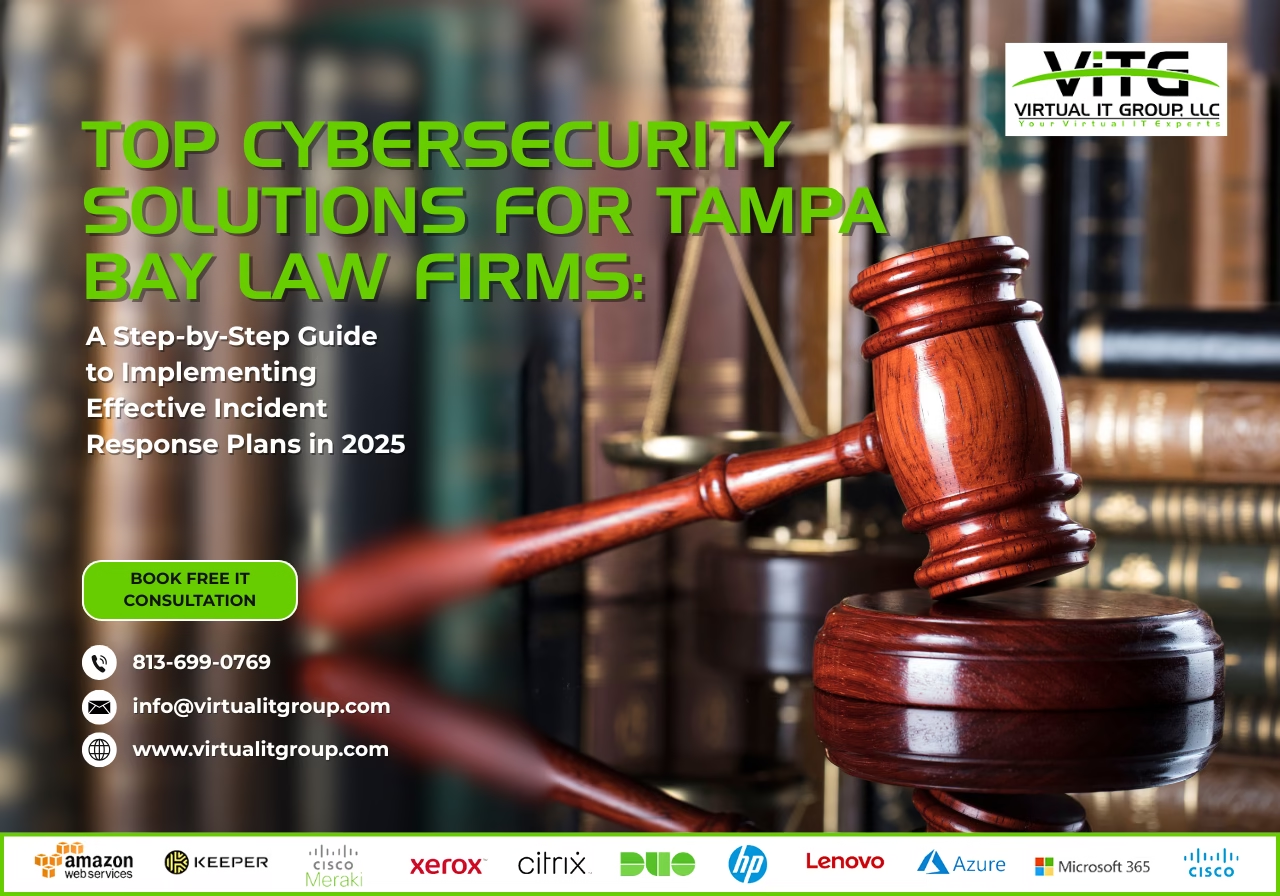The digital age has fundamentally changed how law firms operate, but it has also introduced significant cybersecurity challenges. Law firms in Tampa Bay are handling large amounts of sensitive and confidential information, making them prime targets for cybercriminals. Cyberattacks, including ransomware, data breaches, and phishing, are increasingly common in the legal industry. Law firms, especially those with a lack of robust cybersecurity measures, are vulnerable to significant financial losses, reputational damage, and legal consequences.
This comprehensive guide will help law firms in Tampa Bay understand how to protect their valuable assets through cybersecurity solutions for law firms and implement effective incident response plans (IRPs). By focusing on best practices for cybersecurity in law firms, you will be able to minimize risks and enhance your firm’s digital defense strategy.
Table of Contents
- Introduction
- Why Cybersecurity Is Crucial for Tampa Bay Law Firms
- The Rising Threat of Cybercrime in the Legal Industry
- Legal and Financial Ramifications of Cyber Breaches
- Key Cybersecurity Threats Facing Tampa Bay Law Firms
- Ransomware Attacks
- Data Breaches
- Phishing Scams
- Insider Threats
- Advanced Persistent Threats (APT)
- The Role of Incident Response Plans (IRP) in Law Firm Cybersecurity
- Why Law Firms Should Have an Incident Response Plan
- Steps to Build an Effective Incident Response Plan for Law Firms
- Step 1: Identify Critical Assets and Sensitive Data
- Step 2: Conduct Risk Assessments and Vulnerability Testing
- Step 3: Define Roles and Responsibilities for Cybersecurity
- Step 4: Develop Communication Protocols
- Step 5: Test the Incident Response Plan
- Step 6: Continuously Monitor and Update the Plan
- How Virtual IT Group (VITG) Can Secure Tampa Bay Law Firms
- Comprehensive Cybersecurity Solutions for Law Firms
- Continuous Security Monitoring
- Proactive Vulnerability Management
- Rapid Incident Response
- Data Encryption and Protection
- Employee Security Awareness Training
- Best Cybersecurity Solutions for Tampa Bay Law Firms in 2025
- Cloud-Based Security Solutions
- AI-Powered Threat Detection
- Multi-Factor Authentication (MFA)
- Secure File Sharing and Collaboration Tools
- Conclusion
Top Cybersecurity Solutions for Law Firms in Tampa Bay: A Step-by-Step Guide to Implementing Effective Incident Response Plans in 2025
Why Cybersecurity Is Crucial for Tampa Bay Law Firms
Law firms manage highly sensitive client data, from personal records to business transactions, making them an attractive target for cybercriminals. It’s not just about protecting data—cybersecurity in law firms is also about maintaining client confidence and ensuring compliance with legal regulations.
The Rising Threat of Cybercrime in Legal Industry
The legal industry has seen a rise in cybercrime as hackers target law firms for the wealth of sensitive information they store. With cyberattacks becoming more sophisticated, law firms must invest in proactive cybersecurity measures. This includes adopting tools such as real-time threat monitoring and incident response protocols to minimize the risk.
Legal and Financial Ramifications of Cyber Breaches
Cybersecurity breaches at law firms come with severe consequences. Beyond the financial impact, which can involve fines, lost business, and legal fees, there are also significant reputational risks. Clients expect law firms to protect their most sensitive information, and a breach could result in loss of client confidence, lawsuits, and regulatory penalties.
Key Cybersecurity Threats Facing Tampa Bay Law Firms
Cybercriminals use various tactics to exploit vulnerabilities in law firms’ systems. Below are the most common cybersecurity threats that Tampa Bay law firms must be aware of:
1. Ransomware Attacks
Ransomware is one of the most dangerous threats for law firms in Tampa Bay. It involves encrypting a law firm’s files and demanding a ransom for their release. As legal firms store valuable data, ransomware protection must be a priority.
2. Data Breaches
A data breach occurs when unauthorized individuals gain access to confidential client data. This often happens when cybercriminals exploit vulnerabilities in the firm’s cybersecurity measures. Law firms must implement robust encryption and access controls to protect sensitive information.
3. Phishing Scams
Phishing is a form of social engineering in which hackers impersonate reliable sources to steal sensitive information. Law firms receive a high volume of emails, making them particularly vulnerable to phishing attacks. Phishing prevention includes email filtering and employee security training.
4. Insider Threats
Insider threats refer to situations where employees or contractors intentionally or unintentionally compromise a firm’s security. This is particularly concerning because these threats often go undetected. Law firms should implement strict access control measures to prevent insiders from accessing sensitive data without proper authorization.
5. Advanced Persistent Threats (APT)
Advanced Persistent Threats (APTs) are prolonged and highly sophisticated attacks that allow hackers to infiltrate and extract sensitive data over extended periods. APTs are difficult to detect, making continuous monitoring systems essential for law firms.

Top Cybersecurity Solutions for Law Firms in Tampa Bay: A Step-by-Step Guide to Implementing Effective Incident Response Plans in 2025
The Role of Incident Response Plans (IRP) in Law Firm
An Incident Response Plan (IRP) is crucial for law firms, ensuring they can act quickly and effectively when a cybersecurity breach occurs. With the rapid rise in cyber threats, every law firm must have an IRP in place.
Why Law Firms Should Have an Incident Response Plan
An IRP is necessary for the quick identification and mitigation of cyber incidents. It minimizes damage by ensuring that staff know what to do during a breach. A well-executed IRP can help law firms recover swiftly, preserving client confidence and reducing financial losses.
Steps to Build an Effective Incident Response Plan for Law Firms
Building an effective incident response plan for law firms involves strategic planning, risk assessment, and regular testing. Follow these steps to create a strong IRP:
Step 1: Identify Critical Assets and Sensitive Data
The first step is identifying the critical data your firm holds, such as client records, legal documents, and financial information. Protecting these assets should be the top priority when creating your incident response plan.
Step 2: Conduct Risk Assessments and Vulnerability Testing
Regular risk assessments help identify potential threats to your firm’s systems. Vulnerability testing ensures that weak points are discovered and addressed before cybercriminals can exploit them.
Step 3: Define Roles and Responsibilities for Cybersecurity
It’s essential to have a clear and organized team responsible for handling cyber incidents. This team should include IT experts, legal advisors, and external cybersecurity consultants. Everyone must know their specific role during a cybersecurity incident.
Step 4: Develop Communication Protocols
Effective communication is critical during a cyber event. The IRP should include communication protocols to notify clients, regulatory bodies, and stakeholders. Having pre-prepared breach notifications can save valuable time in crisis situations.
Step 5: Test the Incident Response Plan
Regularly test your IRP through cybersecurity drills and simulated cyberattacks. This will ensure that your team is prepared to handle real-world scenarios and that your cybersecurity strategy remains effective.
Step 6: Continuously Monitor and Update the Plan
Cyber threats are always evolving. Your IRP should be regularly reviewed and updated to address new vulnerabilities and threats. Continuous monitoring tools and regular reviews of your IRP will keep it relevant and effective.

Top Cybersecurity Solutions for Law Firms in Tampa Bay: A Step-by-Step Guide to Implementing Effective Incident Response Plans in 2025
How Virtual IT Group (VITG) Can Secure Tampa Bay Law Firms
Partnering with a reliable cybersecurity provider like Virtual IT Group (VITG) can elevate your firm’s security. VITG offers comprehensive managed cybersecurity services designed to meet the unique challenges faced by law firms in Tampa Bay. These services help minimize risks and ensure your firm is well-protected against cyber threats.
Comprehensive Cybersecurity Solutions for Law Firms
VITG provides a full range of cybersecurity services that include 24/7 monitoring, incident response management, and proactive vulnerability assessments. With the growing threat of cyberattacks, it’s vital for law firms to implement effective defense strategies that protect client data and maintain business continuity.
Continuous Security Monitoring
At VITG, we provide continuous monitoring tools to regularly scan your firm’s systems for potential threats. This proactive approach helps prevent cyberattacks before they escalate into major issues, ensuring that your firm’s data is safeguarded at all times.
- M365 Email, SharePoint, and OneDrive Malware Protection with 24×7 Incident Response ensures continuous protection against known and emerging threats.
- Advanced Threat Detection with Zero Trust Networking further enhances your firm’s security by blocking unauthorized access.
Proactive Vulnerability Management
VITG performs regular system assessments to identify weaknesses in your IT infrastructure. By addressing these vulnerabilities early on, law firms can prevent cybercriminals from exploiting them, reducing the risk of data breaches and other cyberattacks.
- Enterprise Password Manager and Privileged Access Management limit access to sensitive information and help mitigate internal security risks.
- Security Incident and Event Management (SIEM) provides detailed monitoring to proactively detect and resolve suspicious activities.
Rapid Incident Response
Despite best efforts, cyberattacks can still occur. When they do, VITG’s rapid incident response protocols ensure that your firm can respond quickly to contain and resolve the issue, minimizing downtime and restoring operations as efficiently as possible.
- Managed MxDR service with Security Operation Center (SOC) Incident Response provides around-the-clock support during cybersecurity incidents.
- Rapid Remediation and system restoration reduce the overall impact of the attack on your business operations.
Data Encryption and Protection
For law firms, data security is paramount. VITG offers data encryption services to protect sensitive information both in transit and at rest. With this encryption in place, client data remains secure, even in the event of an attempted breach.
- M365 Backup Services ensure your data is recoverable after a cyberattack or system failure, protecting critical client and case files.
- Secure File Sharing platforms ensure that legal documents are exchanged safely and protected from unauthorized access.
Employee Security Awareness Training
Human error is a common factor in many cyber breaches. VITG offers cybersecurity training for your employees to help them recognize threats such as phishing attacks, and follow the best practices for safeguarding sensitive data.
- Email Phishing Simulation helps your team identify malicious emails and avoid falling victim to scams.
- Microsoft 365 and HIPAA training ensure your employees understand security protocols and comply with relevant regulations.

Top Cybersecurity Solutions for Law Firms in Tampa Bay: A Step-by-Step Guide to Implementing Effective Incident Response Plans in 2025
Best Cybersecurity Solutions for Tampa Bay Law Firms in 2025
In 2025, law firms should stay ahead of emerging threats by utilizing the latest cybersecurity technologies. Here are some of the top cybersecurity solutions for law firms:
Cloud-Based Security Solutions
Cloud security is ideal for law firms due to its scalability and flexibility. These solutions offer real-time monitoring and automatic updates to protect your systems from evolving threats.
AI-Powered Threat Detection
AI-driven tools allow law firms to detect cyber threats in real-time. By analyzing vast amounts of data, AI-powered systems can identify unusual patterns and predict potential risks, offering proactive protection.
Multi-Factor Authentication (MFA)
Multi-factor authentication (MFA) adds an extra layer of security by requiring users to provide two or more verification factors before accessing systems or data. This significantly reduces the risk of unauthorized access.
Secure File Sharing and Collaboration Tools
Using secure file-sharing platforms ensures that law firms can safely exchange legal documents with clients and partners without exposing sensitive data. These tools often include encryption, access control, and audit trails.
Conclusion
As cyber threats continue to grow in sophistication, law firms in Tampa Bay must prioritize robust cybersecurity solutions and implement a well-defined incident response plan (IRP). Failing to do so puts sensitive client data, reputation, and business operations at risk.
Investing in cybersecurity for law firms isn’t just about preventing breaches, it’s about securing the future of your firm. Taking proactive steps today will help safeguard client reliance, enhance operational efficiency, and ensure business continuity in the face of cyber risks.
Virtual IT Group provides law firms in Tampa Bay with the necessary tools and expertise to protect sensitive client data from emerging threats. Through continuous monitoring, rapid incident response, and proactive vulnerability management, we ensure that your firm’s cybersecurity is always up to date.
Schedule your free consultation today and see how Virtual IT Group (VITG) can help strengthen your firm’s cybersecurity strategy. Visit www.virtualitgroup.com to learn more and get started.
Frequently Asked Questions (FAQs)
What are the most common cybersecurity threats facing law firms today?
Law firms are prime targets for cybercriminals due to the sensitive nature of the data they handle. Common threats include:
- Ransomware Attacks: Malicious software that locks access to critical data until a ransom is paid.
- Phishing Scams: Deceptive emails or messages designed to trick individuals into revealing confidential information.
- Data Breaches: Unauthorized access to confidential client information, leading to potential legal and financial repercussions.
- Insider Threats: Employees or contractors who intentionally or unintentionally compromise the firm’s security.
- Advanced Persistent Threats (APT): Long-term targeted attacks aimed at stealing sensitive information over extended periods.
Implementing comprehensive cybersecurity measures, such as multi-layered defenses and regular security training, can mitigate these risks.
How can cloud-based solutions enhance a law firm’s cybersecurity?
Cloud-based solutions offer several advantages for law firms:
- Advanced Encryption: Ensures that data is securely transmitted and stored.
- Secure Data Storage: Provides offsite storage options, reducing the risk of data loss due to local disasters.
- Regular Updates: Cloud services often include automatic updates, ensuring that security patches are applied promptly.
- Comprehensive IT Management: Offers centralized management of IT resources, improving efficiency and security.
By leveraging cloud solutions, law firms can enhance their cybersecurity posture while ensuring compliance with industry standards.
How can cloud-based solutions enhance a law firm’s cybersecurity?
Cloud-based solutions offer several advantages for law firms:
- Advanced Encryption: Ensures that data is securely transmitted and stored.
- Secure Data Storage: Provides offsite storage options, reducing the risk of data loss due to local disasters.
- Regular Updates: Cloud services often include automatic updates, ensuring that security patches are applied promptly.
- Comprehensive IT Management: Offers centralized management of IT resources, improving efficiency and security.
By leveraging cloud solutions, law firms can enhance their cybersecurity posture while ensuring compliance with industry standards.
Why is a dedicated IT support important for law firms?
Dedicated IT support offers specialized knowledge in legal software and cybersecurity, providing:
- Continuous Monitoring: Ensures that potential threats are detected and addressed promptly.
- Timely Technical Assistance: Provides immediate support during technical issues, minimizing downtime.
- Proactive Management: Anticipates potential security challenges and implements preventive measures.
For law firms, having dedicated IT support ensures that their systems are secure, compliant, and efficient.
How can law firms ensure compliance with cybersecurity regulations?
Law firms must adhere to various cybersecurity regulations to protect client data and maintain confidence. Steps to ensure compliance include:
- Regular Audits: Conducting periodic security audits to identify vulnerabilities.
- Implementing Best Practices: Adopting industry-standard security measures, such as encryption and multi-factor authentication.
- Staff Training: Educating employees on regulatory requirements and security protocols.
- Documentation: Maintaining records of compliance efforts and security measures.
By staying informed and proactive, law firms can navigate the complex landscape of cybersecurity regulations effectively.
What are the benefits of partnering with a cybersecurity provider like Virtual IT Group (VITG)?
Partnering with VITG offers law firms:
- Customized Solutions: Personalized cybersecurity strategies that align with the firm’s specific requirements.
- Expertise and Experience: Over 30 years of experience in providing cybersecurity services to businesses.
- Comprehensive Services: A range of services, including continuous monitoring, rapid incident response, and proactive vulnerability management.
- Peace of Mind: Ensures that the firm’s data and systems are protected against emerging cyber threats.
Choosing VITG as a cybersecurity partner allows law firms to focus on their core operations while leaving their cybersecurity requirements in expert hands.
How do multi-factor authentication (MFA) and encryption work together to protect law firms?
Multi-factor authentication (MFA) and encryption are two of the most effective tools to safeguard sensitive legal data. Here’s how they work together:
- MFA: Requires users to provide two or more forms of verification before accessing sensitive systems, such as a password and a biometric scan. This adds an extra layer of security by ensuring that unauthorized individuals cannot easily access your firm’s systems.
- Encryption: Ensures that data is converted into an unreadable format while stored or transmitted. Even if cybercriminals manage to intercept the data, they won’t be able to read it without the decryption key.
By combining MFA with encryption, law firms can ensure that both access control and data protection are maximized, significantly lowering the risk of a breach.
What are the best practices for securing law firm emails?
Law firms rely heavily on email for communication, making email security a critical component of their overall cybersecurity strategy. Best practices include:
- Email Filtering: Use advanced email filtering solutions to detect and block malicious emails before they reach employees.
- Encrypt Sensitive Emails: Encrypt emails containing confidential client information to protect it from unauthorized access.
- Educate Employees: Train staff on identifying phishing emails and other common email-based attacks.
- Implement MFA for Email Accounts: Enable multi-factor authentication (MFA) to secure email accounts and prevent unauthorized access.
These best practices ensure that emails remain a secure means of communication within your firm.
How can law firms recover from a cybersecurity breach?
Having a solid disaster recovery plan is essential for law firms to bounce back from a cybersecurity breach. The key steps include:
- Isolate the Threat: Quickly identify and contain the breach to prevent further damage. This is part of your incident response plan.
- Restore from Backups: If the breach involves data loss, restore the affected files from secure, offsite backups. Ensure that these backups are regularly tested.
- Notify Affected Parties: Comply with data breach notification regulations, informing affected clients and relevant authorities promptly.
- Evaluate and Strengthen Defenses: Once the immediate threat is resolved, conduct a full security audit to identify vulnerabilities and enhance your defenses. Regular updates and continuous monitoring are necessary to prevent future attacks. By having a robust disaster recovery plan in place, law firms can minimize the impact of a breach and recover faster.


